| Listing 1 - 10 of 10 |
Sort by
|
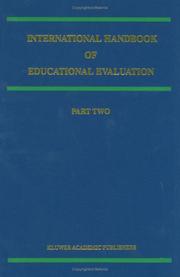
ISBN: 140200849X 9401003092 1780346034 Year: 2003 Publisher: Dordrecht Kluwer
Abstract | Keywords | Export | Availability | Bookmark
 Loading...
Loading...Choose an application
- Reference Manager
- EndNote
- RefWorks (Direct export to RefWorks)
Thomas Kellaghan Educational Research Centre, St. Patrick's College, Dublin, Ireland Daniel L. Stufflebeam The Evaluation Center, Western Michigan University, Ml, USA Lori A. Wingate The Evaluation Center, Western Michigan University, Ml, USA Educational evaluation encompasses a wide array of activities, including student assessment, measurement, testing, program evaluation, school personnel evalua tion, school accreditation, and curriculum evaluation. It occurs at all levels of education systems, from the individual student evaluations carried out by class room teachers, to evaluations of schools and districts, to district-wide program evaluations, to national assessments, to cross-national comparisons of student achievement. As in any area of scholarship and practice, the field is constantly evolving, as a result of advances in theory, methodology, and technology; increasing globalization; emerging needs and pressures; and cross-fertilization from other disciplines. The beginning of a new century would seem an appropriate time to provide a portrait of the current state of the theory and practice of educational evaluation across the globe. It is the purpose of this handbook to attempt to do this, to sketch the international landscape of educational evaluation - its conceptual izations, practice, methodology, and background, and the functions it serves. The book's 43 chapters, grouped in 10 sections, provide detailed accounts of major components of the educational evaluation enterprise. Together, they provide a panoramic view of an evolving field.
Didactic evaluation --- Educational evaluation --- Education --- Social Sciences --- Theory & Practice of Education --- #PBIB:2004.2 --- Educational assessment --- Educational program evaluation --- Evaluation research in education --- Instructional systems analysis --- Program evaluation in education --- Self-evaluation in education --- Evaluation --- Assessment. --- School management and organization. --- School administration. --- Education—Philosophy. --- Assessment, Testing and Evaluation. --- Administration, Organization and Leadership. --- Educational Philosophy. --- Administration, Educational --- Educational administration --- Inspection of schools --- Operation policies, School --- Policies, School operation --- School administration --- School inspection --- School operation policies --- School organization --- Schools --- Management --- Organization --- Inspection --- Management and organization
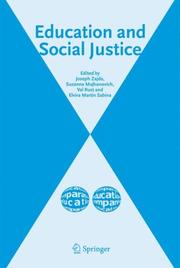
ISBN: 1281067687 9786611067687 1402047223 1402047215 9781402047213 Year: 2006 Publisher: Dordrecht Springer
Abstract | Keywords | Export | Availability | Bookmark
 Loading...
Loading...Choose an application
- Reference Manager
- EndNote
- RefWorks (Direct export to RefWorks)
The book explores the problematic relationship between education, social justice and the State, against the background of comparative education research. Social justice is an attempt to answer the following question: How can we contribute to the creation of a more equitable, respectful, and just society for everyone? The creation of a more equitable, respectful, and just society for everyone is a dream for all empowering and egalitarian pedagogues. But it will remain a mere hollow rhetoric, or magic words, unless we debate more vigorously social inequality in the global culture. The book critiques the existing status quo of stratified school systems, and the unequal distribution of cultural capital and value added schooling. By focusing on social justice globally, the authors attempt to answer one of the most pressing questions: Are social, economic and cultural divisions between the nations, between school sectors, between schools and between students growing or declining? The authors, whenever possible, consider and examine current evidence on education and social stratification, attainment gaps by boys and girls from different SES (socio-economic status) backgrounds, the results of school choice policies, differences in school effectiveness, and international comparisons of attainment. The authors, employing the competing discourses of education and social justice, examine and evaluate critically both the reasons and outcomes of education reforms, policy change, with respect to social justice. They provide a more informed critique on the Western-driven models of social justice and equality. By referring to Bourdieu’s call for critical policy analysts to engage in a ‘critical sociology’ and critical pedagogy, the book examines how central discourses surrounding the debate of education and social justice are formed in the contexts of dominant ideology, power, and culturally and historically derived perceptions and practices.
Education. --- International education. --- Comparative education. --- School management and organization. --- School administration. --- Educational policy. --- Education and state. --- Education --- Educational Philosophy. --- International and Comparative Education. --- Educational Policy and Politics. --- Administration, Organization and Leadership. --- Philosophy. --- Social justice. --- Social aspects. --- Education policy --- Educational policy --- State and education --- Social policy --- Endowment of research --- Government policy --- Equality --- Justice --- Social ethics --- Objectives of teaching --- Education—Philosophy. --- International education . --- Administration, Educational --- Educational administration --- Inspection of schools --- Operation policies, School --- Policies, School operation --- School administration --- School inspection --- School operation policies --- School organization --- Schools --- Management --- Organization --- Education, Comparative --- Global education --- Intellectual cooperation --- Internationalism --- Inspection --- Management and organization --- History
Book
ISBN: 9781402097362 1402097360 904818195X 9786612047886 1282047884 1402097379 Year: 2009 Volume: v. 7 Publisher: Place of publication unknown Springer
Abstract | Keywords | Export | Availability | Bookmark
 Loading...
Loading...Choose an application
- Reference Manager
- EndNote
- RefWorks (Direct export to RefWorks)
This book argues that the educational environment in many countries has shifted so dramatically and so permanently that we urgently need to re-consider what we understand by educational leadership and educational leadership practice. It focuses on distributed leadership and draws on the emerging evidence about the possibilities and shortcomings of this form of leadership and draws upon the latest empirical findings from studies in different countries that have focused on the relationship between distributed forms of leadership and organizational change. The main aim is to offer contemporary, comparative and challenging accounts of distributed leadership practice. Distributed Leadership – Different Perspectives outlines current understandings, findings and limitations of the concept of distributed leadership. It brings together different international perspectives on distributed leadership as well as looking at distributed leadership through three major lenses – the empirical, the interpretive and the critical. Leading writers in the field offer contemporary analysis and reflection on the theme and also consider the future issues, challenges and directions for distributed leadership.
School management --- Educational leadership --- Leadership en éducation --- Educational leadership. --- Theory & Practice of Education --- Education --- Social Sciences --- Leadership. --- Management. --- Administration --- Education. --- School management and organization. --- School administration. --- Educational sociology. --- Assessment. --- Education and sociology. --- Sociology, Educational. --- Administration, Organization and Leadership. --- Assessment, Testing and Evaluation. --- Sociology of Education. --- Ability --- Command of troops --- Followership --- Industrial relations --- Organization --- Educational tests and measuremen. --- Education and sociology --- Social problems in education --- Society and education --- Sociology, Educational --- Sociology --- Administration, Educational --- Educational administration --- Inspection of schools --- Operation policies, School --- Policies, School operation --- School administration --- School inspection --- School operation policies --- School organization --- Schools --- Management --- Aims and objectives --- Inspection --- Management and organization
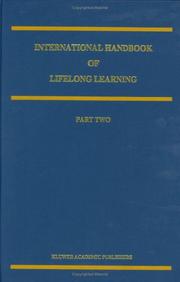
ISBN: 0792368150 9401038163 9401009163 Year: 2001 Publisher: Dordrecht Kluwer
Abstract | Keywords | Export | Availability | Bookmark
 Loading...
Loading...Choose an application
- Reference Manager
- EndNote
- RefWorks (Direct export to RefWorks)
Recent changes in the world effected by the transformations of information technology, globalisation, and the move towards a knowledge economy over the last thirty years have been as radical and fundamental as the changes resulting from the invention of the wheel and the printing press. We are now living in a new age in which the demands are so complex, so multifarious and so rapidly changing that the only way in which we shall be able to survive them is by committing to a process of individual, communal, and global learning throughout the lifespan of all of us. A number of international bodies and agencies have taken cognisance of these transformations and the demands they impose upon societies and communities of the twenty-first century and have developed and articulated policies intended to enable all citizens of the world in the twenty-first century to face these challenges. It is now a declared policy of many governments and international agencies that the only vehicle for such preparation is `education, education, education', and that preparing for the knowledge economy and the learning society of the future has to be a lifelong undertaking, an investment in the future that is not restricted merely to the domain of economic advancement but also to those of social inclusion and personal growth. Realising this, policy-makers across the international arena are grappling with the need to move from systems that emphasise education and training to the radically more unworked construct of lifelong learning. In this volume the editors and authors analyse, criticise, and rework the ideas, principles, and theories underpinning policies and programs of lifelong learning, re-interpreting them in the light of examples of `best practice' found in a range of educating institutions around the world. We believe that students of educational change and community development will find it useful and helpful to have available in this volume some of the most up-to-date thinking on the chief concepts, theories, and values of increasing policy interest in lifelong learning, together with a review of some significant examples of the different forms, focuses, and nexuses of thought and practice on this topic. All this enables us to offer some policy recommendations and practical suggestions as to ways forward in the endeavour to make lifelong learning a reality for all.
Adult education. Lifelong learning --- Education --- Social Sciences --- Theory & Practice of Education --- Continuing education --- Adult education --- Adult learning --- Education, Special Topics --- #PBIB:2002.1 --- Lifelong education --- Lifelong learning --- Permanent education --- Recurrent education --- Andragogical learning --- Adults, Education of --- Education of adults --- Volwasseneneducatie. Permanente vorming --- Learning --- Open learning --- School management and organization. --- School administration. --- International education . --- Comparative education. --- Lifelong learning. --- Adult education. --- Administration, Organization and Leadership. --- International and Comparative Education. --- Lifelong Learning/Adult Education. --- Education, Comparative --- Global education --- Intellectual cooperation --- Internationalism --- Administration, Educational --- Educational administration --- Inspection of schools --- Operation policies, School --- Policies, School operation --- School administration --- School inspection --- School operation policies --- School organization --- Schools --- Management --- Organization --- History --- Inspection --- Management and organization
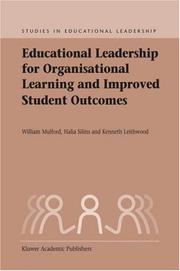
ISBN: 1402019874 9786610148080 128014808X 1402021992 Year: 2004 Publisher: Dordrecht Kluwer
Abstract | Keywords | Export | Availability | Bookmark
 Loading...
Loading...Choose an application
- Reference Manager
- EndNote
- RefWorks (Direct export to RefWorks)
The change in paradigm in our field is away from the great man or woman theory of leadership and the teacher in his or her own classroom to the development of learning communities which value differences and support critical reflection and encourage members to question, challenge, and debate teaching and learning issues. How to achieve such learning communities is far from clear, but we believe the areas of problem-based learning (PBL) and organizational learning (OL) offer valuable clues. The indications are that the successful educational restructuring agenda depends on teams of leaders, whole staffs and school personnel, working together (i.e., OL) linking evidence and practice in genuine collaboration (i.e., PBL). The book is unique in that it is both about and uses these two concepts.
School management --- Education. --- School management and organization. --- School administration. --- Personality. --- Social psychology. --- Education, general. --- Administration, Organization and Leadership. --- Personality and Social Psychology. --- Mass psychology --- Psychology, Social --- Human ecology --- Psychology --- Social groups --- Sociology --- Personal identity --- Personality psychology --- Personality theory --- Personality traits --- Personology --- Traits, Personality --- Individuality --- Persons --- Self --- Temperament --- Administration, Educational --- Educational administration --- Inspection of schools --- Operation policies, School --- Policies, School operation --- School administration --- School inspection --- School operation policies --- School organization --- Schools --- Education --- Management --- Organization --- Children --- Education, Primitive --- Education of children --- Human resource development --- Instruction --- Pedagogy --- Schooling --- Students --- Youth --- Civilization --- Learning and scholarship --- Mental discipline --- Teaching --- Training --- Inspection --- Management and organization
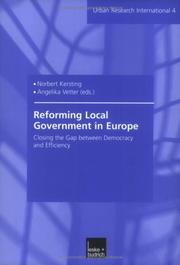
ISBN: 3810039586 3663112586 Year: 2003 Publisher: Opladen Leske+Budrich
Abstract | Keywords | Export | Availability | Bookmark
 Loading...
Loading...Choose an application
- Reference Manager
- EndNote
- RefWorks (Direct export to RefWorks)
Nearly all Western and Central European local government systems have been reformed since the 1990's. Taking into account variations in historical and national context, the book looks for different ways of local government reform, their emphases and their divergent trajectories.
Internal politics --- Europe --- #SBIB:034.IOS --- #SBIB:35H1350 --- Organisatie en beleid: lokale besturen: algemeen --- Democracy --- Local government --- Political science. --- School management and organization. --- School administration. --- Culture—Study and teaching. --- Political Science. --- Administration, Organization and Leadership. --- Regional and Cultural Studies. --- Administration, Educational --- Educational administration --- Inspection of schools --- Operation policies, School --- Policies, School operation --- School administration --- School inspection --- School operation policies --- School organization --- Schools --- Education --- Management --- Organization --- Administration --- Civil government --- Commonwealth, The --- Government --- Political theory --- Political thought --- Politics --- Science, Political --- Social sciences --- State, The --- Inspection --- Management and organization
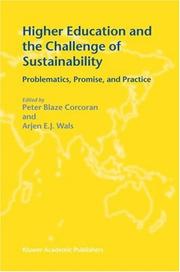
ISBN: 1402021348 1402020260 030648515X 9781402020261 9780306485152 Year: 2004 Publisher: Dordrecht Kluwer Academic
Abstract | Keywords | Export | Availability | Bookmark
 Loading...
Loading...Choose an application
- Reference Manager
- EndNote
- RefWorks (Direct export to RefWorks)
Sustainability challenges universities around the world to rethink their missions and to re-structure their courses, research programs, and life on campus. Graduates are increasingly exposed to notions of sustainability, which are emotionally, politically, ethically, and scientifically charged. They must be able to deal with conflicting norms and values, uncertain outcomes and futures, and a changing knowledge base. At the same time they will need to be able to contextualize knowledge in an increasingly globalized society. This book provides a variety of valuable theoretical and practical resources for students, teachers, researchers, and administrators who seek to integrate sustainability in higher education. Sustainability is not only explored as both an outcome and a process of learning, but as a catalyst for educational change and institutional innovation. The book raises the various problematics related to this inchoate field and provides an intellectual history and critical assessment of the prospects for institutionalizing sustainability in higher education.
School management --- Higher education --- Education, Higher --- Sustainable development. --- Enseignement supérieur --- Développement durable --- Environmental aspects. --- Economic aspects. --- Aspect de l'environnement --- Aspect économique --- Education, Higher -- Economic aspects. --- Education, Higher -- Environmental aspects. --- Electronic books. -- local. --- Sustainable development --- Theory & Practice of Education --- Education --- Social Sciences --- Environmental aspects --- Economic aspects --- S20090394.JPG --- duurzame ontwikkeling --- hoger onderwijs --- duurzaam ondernemen --- onderwijs, universitair en voortgezet --- Development, Sustainable --- Ecologically sustainable development --- Economic development, Sustainable --- Economic sustainability --- ESD (Ecologically sustainable development) --- Smart growth --- Sustainable economic development --- Economic development --- College students --- Postsecondary education --- Universities and colleges --- 504 --- 378 --- Ethics. --- Curriculums (Courses of study). --- School management and organization. --- School administration. --- Higher education. --- Environmental management. --- Economics. --- Management science. --- Economics, general. --- Higher Education. --- Administration, Organization and Leadership. --- Environmental Management. --- Curriculum Studies. --- Curricula. --- Education, Higher. --- Curriculum planning. --- Education—Curricula. --- Core curriculum --- Courses of study --- Curricula (Courses of study) --- Curriculums (Courses of study) --- Schools --- Study, Courses of --- Instructional systems --- Deontology --- Ethics, Primitive --- Ethology --- Moral philosophy --- Morality --- Morals --- Philosophy, Moral --- Science, Moral --- Philosophy --- Values --- Environmental stewardship --- Stewardship, Environmental --- Environmental sciences --- Management --- Administration, Educational --- Educational administration --- Inspection of schools --- Operation policies, School --- Policies, School operation --- School administration --- School inspection --- School operation policies --- School organization --- Organization --- Quantitative business analysis --- Problem solving --- Operations research --- Statistical decision --- Economic theory --- Political economy --- Social sciences --- Economic man --- Curricula --- Inspection --- Management and organization --- Organization and Leadership. --- Moral Philosophy and Applied Ethics.
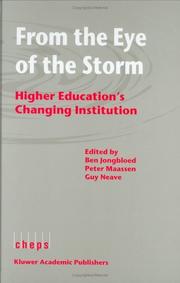
ISBN: 0792360656 9048153557 9401592632 Year: 1999 Publisher: Dordrecht Kluwer Academic Publishers
Abstract | Keywords | Export | Availability | Bookmark
 Loading...
Loading...Choose an application
- Reference Manager
- EndNote
- RefWorks (Direct export to RefWorks)
In order to celebrate the fifteenth anniversary - the third lustrum - of our Center, we at CHEPS decided to collectively write a book on the issue of how higher education institutions deal with the demand for change. Institutional change is without any doubt one of the burning issues for researchers in higher education and policy studies in general, but even more so for administrators at the institutional level (institutional leadership, deans) and planners of higher education in public life (government agencies, intermediary organisations, international organisations). Whereas the lustrumbook we wrote for our second lustrum concentrated on comparative policy studies, many of them focusing on comparisons between different national higher education systems, this time the object of our analyses is the institution itself. Today's higher education institutions are faced by demands from a multitude of actors - from inside the institution (students, staff) as well as from the institution's environment (governments, employers, research councils, sponsors). These demands require changes in policy, practice, systems, and culture. The ways in which institutions respond to these demands and how their behaviour may be understood and predicted is the challenge tackled by the authors of this volume, each from their own perspective and each looking at different aspects of the educational organisation.
School management --- Higher education --- Educational change --- -Education, Higher --- -#SBIB:316.334.1O212 --- #SBIB:316.334.1O360 --- College students --- Postsecondary education --- Universities and colleges --- Change, Educational --- Education change --- Education reform --- Educational reform --- Reform, Education --- School reform --- Educational planning --- Educational innovations --- Administration --- Onderwijsbeleid: nationaal --- Onderwijssociologie: curriculum: algemeen --- Education --- Education, Higher --- Pedagogiek en onderwijskunde --- Administration. --- onderwijsbeleid --- onderwijsbeleid. --- Onderwijsbeleid. --- #SBIB:316.334.1O212 --- Education. --- School management and organization. --- School administration. --- Education, general. --- Administration, Organization and Leadership. --- Administration, Educational --- Educational administration --- Inspection of schools --- Operation policies, School --- Policies, School operation --- School administration --- School inspection --- School operation policies --- School organization --- Schools --- Management --- Organization --- Children --- Education, Primitive --- Education of children --- Human resource development --- Instruction --- Pedagogy --- Schooling --- Students --- Youth --- Civilization --- Learning and scholarship --- Mental discipline --- Teaching --- Training --- Inspection --- Management and organization
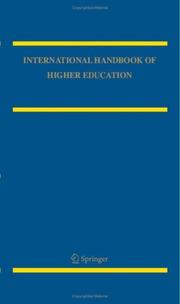
ISBN: 1281338710 9786611338718 1402040121 1402040113 9781402040115 Year: 2006 Publisher: Dordrecht Springer
Abstract | Keywords | Export | Availability | Bookmark
 Loading...
Loading...Choose an application
- Reference Manager
- EndNote
- RefWorks (Direct export to RefWorks)
Higher education is a truly global activity, built around the intersections of international knowledge networks in which institutions, faculty and students explore, create and share knowledge. Virtually all colleges and universities stem from a common organizational model and intellectual history, and academic disciplines are defined worldwide in common terms – the study of sociology in Japan or Germany is seen roughly the same as the study of sociology in Canada or the United States. The purpose of this publication is to provide a central, authoritative reference source on the most essential topics of higher education. The International Handbook of Higher Education combines a rich diversity of scholarly perspectives with a wide range of internationally derived descriptions and analyses. Chapters in the first volume cover central themes in the study of higher education, while contributors to the second volume focus on contemporary higher education issues within specific countries or regions. Together, these volumes provide a centralized, easily accessible, yet scholarly source of information. Research scholars and graduate level students in higher education and related fields will find the Handbook useful for advancing their exploration of these central issues, while policymakers and academic administrators will find the thoughtful essays on a particular topic useful for decision-making. Overall, this Handbook provides a centralized collection of scholarship on an essential worldwide social institution. .
Education, Higher --- Postsecondary education. --- Post high school education --- Post-secondary education --- Tertiary education --- Education --- College students --- Higher education --- Postsecondary education --- Universities and colleges --- Sociology of education --- Education, Higher. --- Higher Education. --- International and Comparative Education. --- Administration, Organization and Leadership. --- Educational Policy and Politics. --- Sociology of Education. --- Higher education. --- International education . --- Comparative education. --- School management and organization. --- School administration. --- Educational policy. --- Education and state. --- Educational sociology. --- Administration, Educational --- Educational administration --- Inspection of schools --- Operation policies, School --- Policies, School operation --- School administration --- School inspection --- School operation policies --- School organization --- Schools --- Management --- Organization --- Education, Comparative --- Global education --- Intellectual cooperation --- Internationalism --- Education and sociology --- Social problems in education --- Society and education --- Sociology, Educational --- Sociology --- Education policy --- Educational policy --- State and education --- Social policy --- Endowment of research --- Inspection --- Management and organization --- History --- Aims and objectives --- Government policy
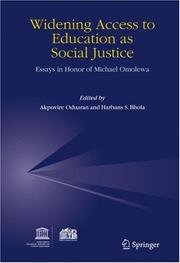
ISBN: 1280624957 9786610624959 1402043244 1402043236 1402043228 Year: 2006 Publisher: Dordrecht Springer
Abstract | Keywords | Export | Availability | Bookmark
 Loading...
Loading...Choose an application
- Reference Manager
- EndNote
- RefWorks (Direct export to RefWorks)
Access to education for all, everywhere, is among the priorities advanced by the International Panel on Democracy and Development. It would be illusory to seek to promote development or to claim to strengthen democracy without focusing, at the same time, on eradicating the scourge of illiteracy, which still, today, affects one adult in five in the world. Universal access to education, a gage of social justice, is much more than a right—it is an open door to freedom: the freedom to initiate, to act and to take one’s own destiny in hand. True, access to education has progressed considerably in recent years, notably to the benefit of women who, nonetheless, still represent two-thirds of illiterate adults. But the strides made conceal widening disparities, with some countries still suffering from a combination of backwardness and inequality. This means that we must step up our efforts. This book, issued in honor of the President of the General Conference of UNESCO, Michael Abiola Omolewa, who has devoted his life to the cause of education, is a major contribution to helping women and men of goodwill, who must more than ever fight to secure for the have-nots of this world the right to education. Boutros Boutros-Ghali Chairperson of the International Panel on Democracy and Development, UNESCO Former Secretary-General of the United Nations.
Right to education. --- Educational equalization. --- Educational inequality --- Equal education --- Equal educational opportunity --- Equalization, Educational --- Education --- Affirmative action programs in education --- Right to learn --- Civil rights --- Education, Compulsory --- Education and state --- Educational equalization --- Educational law and legislation --- Aims and objectives --- Social ethics --- Objectives of teaching --- Human rights --- Education, general. --- International and Comparative Education. --- Educational Policy and Politics. --- Administration, Organization and Leadership. --- Sociology of Education. --- Education. --- International education . --- Comparative education. --- Educational policy. --- Education and state. --- School management and organization. --- School administration. --- Educational sociology. --- Education and sociology --- Social problems in education --- Society and education --- Sociology, Educational --- Sociology --- Administration, Educational --- Educational administration --- Inspection of schools --- Operation policies, School --- Policies, School operation --- School administration --- School inspection --- School operation policies --- School organization --- Schools --- Management --- Organization --- Education policy --- Educational policy --- State and education --- Social policy --- Endowment of research --- Education, Comparative --- Global education --- Intellectual cooperation --- Internationalism --- Children --- Education, Primitive --- Education of children --- Human resource development --- Instruction --- Pedagogy --- Schooling --- Students --- Youth --- Civilization --- Learning and scholarship --- Mental discipline --- Teaching --- Training --- Inspection --- Management and organization --- Government policy --- History
| Listing 1 - 10 of 10 |
Sort by
|

 Search
Search Feedback
Feedback About UniCat
About UniCat  Help
Help News
News